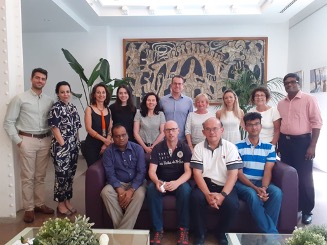 A nested study within the NIHR Global Health Research Group on Atrial Fibrillation management (Global AF Reach) 2018-22
A nested study within the NIHR Global Health Research Group on Atrial Fibrillation management (Global AF Reach) 2018-22
As a part of Global AF Reach, two studies have been included across the three countries to investigate the current clinical pathways and handover practices for AF patients (incident and prevalent cases) in Brazil, China, and Sri Lanka.The first study is a pilot study investigating AF patient care seeking pathways and loss to follow-up after diagnosis during an admission, or a visit to primary care or A&E (incident cases)
The second study is investigating AF patient management, clinical pathways, care-seeking behaviours, and loss to follow-up once seen at tertiary centres (prevalent cases)
Outputs
Publications:
Goulart AC, Varella AC, Gooden T, Lip G, Jolly K, Thomas GN, Lotufo PA, Greenfield S, Olmos RD, Bensenor IM, Manaseki-Holland S. Identifying and understanding the care pathway of patients with atrial fibrillation in Brazil and the impact of the COVID-19 pandemic: A mixed-methods study. PLOS One. 2023 Sep 22.
Gooden TE, Wang J, Carvalho Goulart A, Varella AC, Tai M, Sheron VA, Wang H, Zhang H, Zhong J, Kumarendran B, Nirantharakumar K. Generalisability of and lessons learned from a mixed-methods study conducted in three low-and middle-income countries to identify care pathways for atrial fibrillation. Global Health Action. 2023 Dec 31;16(1):2231763.
Sheron VA, Shanmugathas S, Gooden TE, Guruparan M, Kumarendran B, Lip GY, Manaseki-Holland S, Nirantharakumar K, Shribavan K, Subaschandren K, Haniffa R. Healthcare provider and patient perspectives on access to and management of atrial fibrillation in the Northern Province, Sri Lanka: a rapid evaluation of barriers and facilitators to care. BMC health services research. 2022 Aug 23;22(1):1078.
Paschoal E, Gooden TE, Olmos RD, Lotufo PA, Benseñor IM, Manaseki-Holland S, Lip GY, Thomas GN, Jolly K, Lancashire E, Lane DA. Health care professionals’ perceptions about atrial fibrillation care in the Brazilian public primary care system: a mixed-methods study. BMC Cardiovascular Disorders. 2022 Dec 22;22(1):559.
Research Team and Project Partners

September 2022 Barcelona at the end-of-grant Global AF Reach meeting
- Dr Semira Manaseki-Holland, Reader in Public Health, University of Birmingham, UK
- Professor Neil Thomas, Professor in Epidemiology and Research Methods, Institute Director of Research Knowledge and Transfer, University of Birmingham, UK
- Professor Sheila Greenfield, Professor of Medical Sociology, University of Birmingham, UK
- Professor Kate Jolly, Professor of Public Health and Primary Care, Deputy Director of the Institute of Applied Health Research, University of Birmingham, UK
- Dr Krishnarajah Nirantharakumar, UKRI Innovation Clinical Fellow, Honorary Consultant in Public Health Medicine, University of Birmingham, UK
- Professor Greg Lip, Price-Evans Chair of Cardiovascular Medicine, University of Liverpool, UK Distinguished Professor, Aalborg University, Denmark
- Dr Deirdre Lane, Reader in Cardiovascular Health, University of Liverpool, UK; Adjunct Professor, Aalborg University, Denmark
- Associate Professor Yutao Guo, Chinese People’s Liberation Army General Hospital, Beijing, China
- Professor Feng Mei, Director of General Practice and Vice President of Shanxi Provincial GP Training and Research Center, Shanxi DaYi Hospital, Shanxi, China
- Professor. Li Xuewen, Vice-president and Director of Cardiology , Shanxi DaYi Hospital, China
- Professor Paulo A. Lotufo, Professor & Director, University of São Paulo, Brazil
- Dr Isabela M. Benseñor, Associate Professor, Faculdade de Medicina da Universidade de São Paulo, Brazil
- Dr Rodrigo Olmos, Assistant Professor, University of São Paulo, Brazil
- Dr Gustavo Gusso, Assistant Professor, University of São Paulo, Brazil
- Dr Alessandra Goulart, Associate Professor, Faculdade de Medicina da Universidade de São Paulo, Brazil
- Dr Rajendra Surenthirakumaran, Senior Lecturer & Consultant Community Physician, University of Jaffna, Sri Lanka
- Dr Ajini Arasalingam, Senior Lecturer in Medicine & Honorary Consultant Neurologist, University of Jaffna, Sri Lanka
- Dr Subaschandren Kumaran, Senior Lecturer & Consultant Family Physician, University of Jaffna, Sri Lanka
- Dr Balachandran Kumarendran, Senior Lecturer & Consultant Community Physician, University of Jaffna, Sri Lanka
- Dr Mahesan Guruparan, Consultant Cardiologist, Teaching Hospital Jaffna, Sri Lanka
Funders: